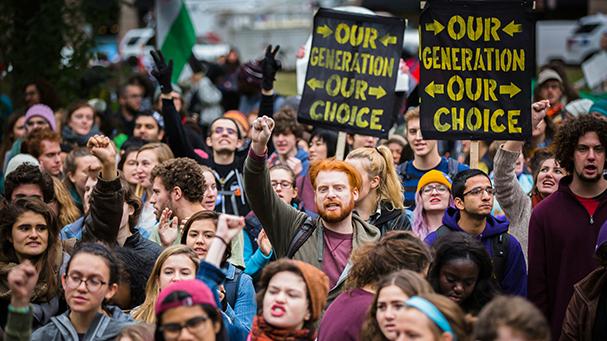Millennials are the new ‘fossil fuel freedom fighters’
The fossil-free fight is energized by a new generation of writers and activists, according to a new book.
A new generation of nature writers is coming of age in America. They are beginning to understand how much of the pristine landscape their parents and grandparents enjoyed is now gone.
Some of the work of these new writers is collected in the book, "Coming of Age at the End of Nature." Activist Bonnie Frye Hemphill wrote one of the essays, titled "Fossil Fuel Freedom Fighters." In it, she explains why, despite difficult odds, her generation is working toward a transition away from fossil fuels. Below is an excerpt and some of her comments about what motivated her to write it:
Everything and nothing about the planet has changed in my lifetime. I am 27. Everything, because I have never known a time when our home didn't have a man-made fever; and nothing, because we've done so little to stop stoking it. "Global warming is all we've ever known," Ben Lowe, a founder of Young Evangelicals for Climate Action, explained to the Wall Street Journal.
This conundrum makes Bill McKibben's 1989 book, "The End of Nature," into Cassandra and a time capsule — prescient, ignored and almost buried.
My grandmothers have told me stories of the World War II years, when Americans knew they had to work together and hard, because justice was not a given. My parents' generation then fought for social and environmental action, but they thought they could fully succeed. Their sign said, "Save the Earth,” because they thought they could.
Like my grandmothers, we twenty-somethings don't assume climate justice will be done. We know that we must work for it. But unlike our parents, we who have come of age at the end of nature have grown past that naïveté about the planet's durability. We know that we cannot stop the climate from destabilizing.
My parents used to introduce me to their friends by offering with pride that I wanted to save the world. My gut clenched every time, because I'm not that dumb. I have no illusions that we will save the planet from the fossil fuel binge of recent centuries. The planet we have all known is over.
We're now locked into the crazy weather that is on the news every night. But we can prevent collapse. We can protect our home enough to protect the human lives and livelihoods that depend on it, and in seeking that salvation we might end up building something better than the status quo. After all, we're aiming for an economy powered by energy that doesn't blow up, innovations that require tons of new jobs, and a democracy disinfected from the desperate campaign donations of fossil fuel fat cats afraid of the future.
My generation is hopeful, practical, strategic and muscular — and not naïve. In fact, we are staking our very sense of self on it. We want history to write us as the ones who got to work. We are the fossil fuel freedom fighters and we’re on the move.
“I was in Doha, Quatar, right around the time I was writing this essay,” Hemphill says. “It was for the UN climate conference there. One of the most meaningful parts of that visit was checking out the convention center, where different groups could [present] displays on what they're doing to solve climate change. Several of the world’s largest oil producers had literally acres-wide displays that were 'bleachy' and gleaming and pastel-colored and utterly deserted. The whole thing was such a farce.”
"I kept coming back to a theme of honesty. Those who would deny climate change are desperate and delusional for building these massive displays on the climate action that BP is trying to take credit for. They're in denial. Anyone who’s got everything to lose should not be trusted. So, the sort of derangement of climate denial comes off as so dishonest; whereas, by contrast, those of us who are fighting climate change are honest with the facts — the brutal facts of chemistry and physics that are warming our home — but also honest with ourselves that we cannot solve the problem anymore."
"Today's pollution has locked us in for 100 years of warming. I can't save the world from climate change, but I can help take the edge off it. There's a very big difference between rising seas that come up a couple of feet or come up 10 feet. The difference is Bangladesh, the difference is Florida."
"I've been working on this theme of freedom from fossil fuels for quite a while in my own mind. [We hear] a common theme [from] those who would want to keep us on fossil fuels forever: 'Well, there's no other way. You drive a car so you must be disingenuous.' I think that's answering the wrong question. I think the right question is not that I want to drive my car on gasoline. It's that I want to get from point A to point B. Offering freedom from fossil-fuel-only choices is what we're all about."
"There is real anger here. I think there are some stages of grief going on. I'm certainly not angry at those of previous generations who are doing their part for climate action. I’m angry at those who would prevent us — me — from solving their problem."
This essay first appeared in audio form on PRI’s Living on Earth with Steve Curwood.
Every day, reporters and producers at The World are hard at work bringing you human-centered news from across the globe. But we can’t do it without you. We need your support to ensure we can continue this work for another year.
Make a gift today, and you’ll help us unlock a matching gift of $67,000!
